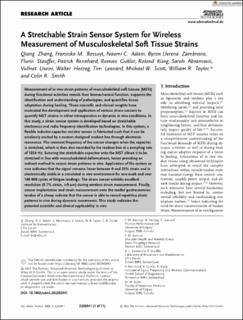Please use this identifier to cite or link to this item:
https://doi.org/10.21256/zhaw-28532Full metadata record
| DC Field | Value | Language |
|---|---|---|
| dc.contributor.author | Zhang, Qiang | - |
| dc.contributor.author | Bossuyt, Fransiska M. | - |
| dc.contributor.author | Adam, Naomi C. | - |
| dc.contributor.author | Zambrano, Byron Llerena | - |
| dc.contributor.author | Stauffer, Flurin | - |
| dc.contributor.author | Rennhard, Patrick | - |
| dc.contributor.author | Gubler, Roman | - |
| dc.contributor.author | Küng, Roland | - |
| dc.contributor.author | Abramovic, Sarah | - |
| dc.contributor.author | Useini, Vullnet | - |
| dc.contributor.author | Herzog, Walter | - |
| dc.contributor.author | Leonard, Tim | - |
| dc.contributor.author | Scott, Michael W. | - |
| dc.contributor.author | Taylor, William R. | - |
| dc.contributor.author | Smith, Colin R. | - |
| dc.date.accessioned | 2023-08-30T14:19:53Z | - |
| dc.date.available | 2023-08-30T14:19:53Z | - |
| dc.date.issued | 2023 | - |
| dc.identifier.issn | 2365-709X | de_CH |
| dc.identifier.uri | https://digitalcollection.zhaw.ch/handle/11475/28532 | - |
| dc.description.abstract | Measurement of in vivo strain patterns of musculoskeletal soft tissues (MSTs) during functional activities reveals their biomechanical function, supports the identification and understanding of pathologies, and quantifies tissue adaptation during healing. These scientific and clinical insights have motivated the development and application of various strain sensors to quantify MST strains in either intraoperative or dynamic in vivo conditions. In this study, a strain sensor system is developed based on stretchable electronics and radio frequency identification technologies. In this system, a flexible inductor-capacitor-resistor sensor is fabricated such that it can be wirelessly excited by a custom-designed readout box through electronic resonance. The resonant frequency of the sensor changes when the capacitor is stretched, which is then also recorded by the readout box at a sampling rate of 1024 Hz. Suturing the stretchable capacitor onto the MST allows it to be stretched in line with musculoskeletal deformations, hence providing an indirect method to assess strain patterns in vivo. Application of the system ex vivo indicates that the signal remains linear between 0 and 25% strain and is electronically stable in a simulated in vivo environment for one week and over 100 000 cycles of fatigue loadings. The strain sensor exhibits excellent resolution (0.1% strain, ≈9 µm) during wireless strain measurement. Finally, sensor implantation and strain measurement onto the medial gastrocnemius tendon of a sheep indicate that the sensor is able to record repetitive strain patterns in vivo during dynamic movements. This study indicates the potential scientific and clinical applicability in vivo. | de_CH |
| dc.language.iso | en | de_CH |
| dc.publisher | Wiley | de_CH |
| dc.relation.ispartof | Advanced Materials Technologies | de_CH |
| dc.rights | https://creativecommons.org/licenses/by-nc-nd/4.0/ | de_CH |
| dc.subject.ddc | 005: Computerprogrammierung, Programme und Daten | de_CH |
| dc.title | A stretchable strain sensor system for wireless measurement of musculoskeletal soft tissue strains | de_CH |
| dc.type | Beitrag in wissenschaftlicher Zeitschrift | de_CH |
| dcterms.type | Text | de_CH |
| zhaw.departement | School of Engineering | de_CH |
| zhaw.organisationalunit | Institute of Signal Processing and Wireless Communications (ISC) | de_CH |
| dc.identifier.doi | 10.1002/admt.202202041 | de_CH |
| dc.identifier.doi | 10.21256/zhaw-28532 | - |
| zhaw.funding.eu | No | de_CH |
| zhaw.issue | 12 | de_CH |
| zhaw.originated.zhaw | Yes | de_CH |
| zhaw.pages.start | 2202041 | de_CH |
| zhaw.publication.status | publishedVersion | de_CH |
| zhaw.volume | 8 | de_CH |
| zhaw.publication.review | Peer review (Publikation) | de_CH |
| zhaw.funding.snf | 182241 | de_CH |
| zhaw.webfeed | Elektronik und Hochfrequenztechnik | de_CH |
| zhaw.webfeed | Wireless Communication | de_CH |
| zhaw.author.additional | No | de_CH |
| zhaw.display.portrait | Yes | de_CH |
| Appears in collections: | Publikationen School of Engineering | |
Files in This Item:
| File | Description | Size | Format | |
|---|---|---|---|---|
| 2023_Zhang-etal_Stretchable-strain-sensor-system-wireless-measurement.pdf | 3.14 MB | Adobe PDF |  View/Open |
Show simple item record
Zhang, Q., Bossuyt, F. M., Adam, N. C., Zambrano, B. L., Stauffer, F., Rennhard, P., Gubler, R., Küng, R., Abramovic, S., Useini, V., Herzog, W., Leonard, T., Scott, M. W., Taylor, W. R., & Smith, C. R. (2023). A stretchable strain sensor system for wireless measurement of musculoskeletal soft tissue strains. Advanced Materials Technologies, 8(12), 2202041. https://doi.org/10.1002/admt.202202041
Zhang, Q. et al. (2023) ‘A stretchable strain sensor system for wireless measurement of musculoskeletal soft tissue strains’, Advanced Materials Technologies, 8(12), p. 2202041. Available at: https://doi.org/10.1002/admt.202202041.
Q. Zhang et al., “A stretchable strain sensor system for wireless measurement of musculoskeletal soft tissue strains,” Advanced Materials Technologies, vol. 8, no. 12, p. 2202041, 2023, doi: 10.1002/admt.202202041.
ZHANG, Qiang, Fransiska M. BOSSUYT, Naomi C. ADAM, Byron Llerena ZAMBRANO, Flurin STAUFFER, Patrick RENNHARD, Roman GUBLER, Roland KÜNG, Sarah ABRAMOVIC, Vullnet USEINI, Walter HERZOG, Tim LEONARD, Michael W. SCOTT, William R. TAYLOR und Colin R. SMITH, 2023. A stretchable strain sensor system for wireless measurement of musculoskeletal soft tissue strains. Advanced Materials Technologies. 2023. Bd. 8, Nr. 12, S. 2202041. DOI 10.1002/admt.202202041
Zhang, Qiang, Fransiska M. Bossuyt, Naomi C. Adam, Byron Llerena Zambrano, Flurin Stauffer, Patrick Rennhard, Roman Gubler, et al. 2023. “A Stretchable Strain Sensor System for Wireless Measurement of Musculoskeletal Soft Tissue Strains.” Advanced Materials Technologies 8 (12): 2202041. https://doi.org/10.1002/admt.202202041.
Zhang, Qiang, et al. “A Stretchable Strain Sensor System for Wireless Measurement of Musculoskeletal Soft Tissue Strains.” Advanced Materials Technologies, vol. 8, no. 12, 2023, p. 2202041, https://doi.org/10.1002/admt.202202041.
Items in DSpace are protected by copyright, with all rights reserved, unless otherwise indicated.